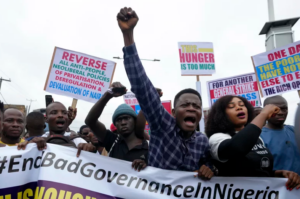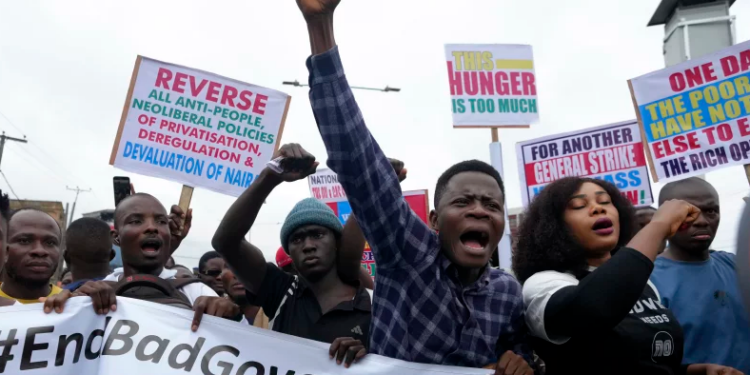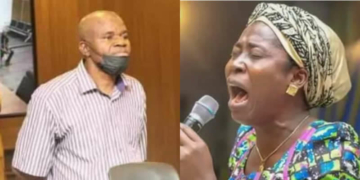The month of August has seen a series of significant events in Nigeria. From a 10-day nationwide protest to an attack on the LGBTQ+ community, and the NLC invasion, these events are shaping the country’s democracy and public perception of government institutions.
August 1st Protest
On August 1st, Nigerians across different states protested against the high cost of living, hunger, high levels of unemployment, and limited access to quality education, among other concerns. The protest, under the hashtag #EndBadGovernance, saw Nigerians take to the streets to express their grievances, which led to the deaths of 22 people, according to Amnesty International’s Nigeria office. Additionally, at least 31 journalists were attacked while covering the #EndBadGovernanceInNigeria protests, according to the Press Attack Tracker (PAT).

The demands of the protesters include scrapping the 1999 constitution, abolishing the Senate arm of the Nigerian Legislative System, paying Nigerian workers a minimum wage of no less than N250,000 monthly, investing heavily in education, and providing Nigerian students with grants, not loans. They also demanded the unconditional release of Mazi Nnamdi Kanu and the demilitarization of the South East.
Other demands include the renationalization of publicly owned enterprises sold to government officials, the reinstatement of a corruption-free subsidy regime to reduce hunger, starvation, and multidimensional poverty, the probing of past and present Nigerian leaders who have looted the treasury, the recovery of their loot, and the deposit of it in a special account to fund education, healthcare, and infrastructure. Additionally, they called for the restructuring of Nigeria to accommodate its diversity, resource control, decentralization, regional development, and the reform of security agencies to stop continuous human rights violations, as well as the duplication of security agencies to enhance the physical security of Nigerian citizens.
The protesters are also demanding the establishment of a Special Energy Fund to drive massive, corruption-free power sector development, the immediate reconstitution of the Independent National Electoral Commission (INEC) to remove corrupt individuals and partisan hacks appointed to manipulate elections, massive investment in public works and industrialization to employ Nigeria’s teeming youths, and a massive shake-up in the Nigerian judiciary to remove cabals of corrupt judges and judicial officers who continue to deny everyday citizens access to real justice.
Attack On The LGBTQ+ Community
On August 9th, Nigerians woke up to the news of the murder of a popular Abuja-based crossdresser, known as Area Mama. His body was found dumped by the roadside in the Federal Capital Territory (FCT), Abuja, the previous day.

The FCT Commissioner of Police, Benneth Igweh, ordered an immediate investigation into his murder. According to a statement released by the FCT Police Command spokesperson, Josephine Adeh, the police are investigating the matter and gathering additional information.
“In response to a distress call received by the Command Control Room that an unidentified lady was seen lying motionless along Katampe – Mabushi Expressway, a team of detectives was immediately dispatched to the scene.
“Preliminary investigations revealed that the individual was a man fully dressed in female clothing with no means of identification on him. He was immediately taken to Maitama District Hospital where doctors on duty confirmed him dead.
“The Commissioner of Police, FCT, has promptly ordered a thorough and discreet investigation to unravel the circumstances surrounding his death. Updates on this matter will be communicated in due course,” she said.
This incident occurred three days after Lagos-based popular crossdresser Bobrisky regained his freedom after serving a jail term for mutilating the Naira.
NLC Invasion
On August 8th, the Nigeria Labour Congress (NLC) confirmed that its national office in Abuja was invaded by security operatives, believed to be from the Department of State Services and the Nigeria Police Force, on the night of August 7th.
According to a statement by NLC spokesperson Benson Upah, the operatives arrested the security guards and forced them to hand over keys to the offices on the second floor. The operatives then broke into the floor, ransacked the bookshop, and stole hundreds of books and publications.
A day later, the Nigeria Police clarified that it did not raid the secretariat of the Nigeria Labour Congress (NLC). The NPF, through its spokesman Muyiwa Adejobi, said a suspected criminal was traced to a shop in the Central Business District of Abuja, which coincidentally was in the NLC building.
“Detectives, armed with the appropriate legal authority, conducted an operation at the location, which turned out to be the NLC building,” he said.
The NLC has since demanded an apology from the federal government and the police authorities, describing the invasion as a deliberate and provocative government action. The labor union said the police’s explanation was “an afterthought and an attempt to cover the hidden motives behind such action as it raises more questions than answers.”
In a communiqué signed by the NLC president, Joe Ajaero, he stated that while the union would exercise restraint in the face of provocation, “the response of the government to our queries will determine our next line of action in the coming days.”




Discussion about this post